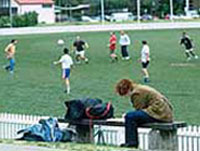|
|||||||||||||||||||||||||||||||||||||||||||||||||||||||||||
| Comparative Criminal Justice: From Investigation to Trial - LAWS3009 | |||||||||||||||||||||||||||||||||||||||||||||||||||||||||||

Description This course provides a grounding in comparative law study, focusing on aspects of policing, prosecution and criminal trial practice in various jurisdictions.
LLM Specialisations Human Rights and Social Justice; Asian and Comparative Law; Criminal Justice and Criminology.
Recommended Prior Knowledge None
Course Objectives The course will provide an opportunity for students to develop knowledge and understanding of how other systems of criminal process function and their understanding of important legal and law-related issues within a comparative framework. It will offer an opportunity for students to sharpen their critical analytical skills and develop their ability to undertake independent high quality research and to structure, write and develop a thesis on a criminal justice topic within a comparative context.
Main Topics
Assessment
Course Texts Prescribed Recommended
None Resources Additional course materials, available from the UNSW Bookshop from mid February and a course website will provide additional readings and be used, with email, for circulating messages relating to the course.
|
|||||||||||||||||||||||||||||||||||||||||||||||||||||||||||


